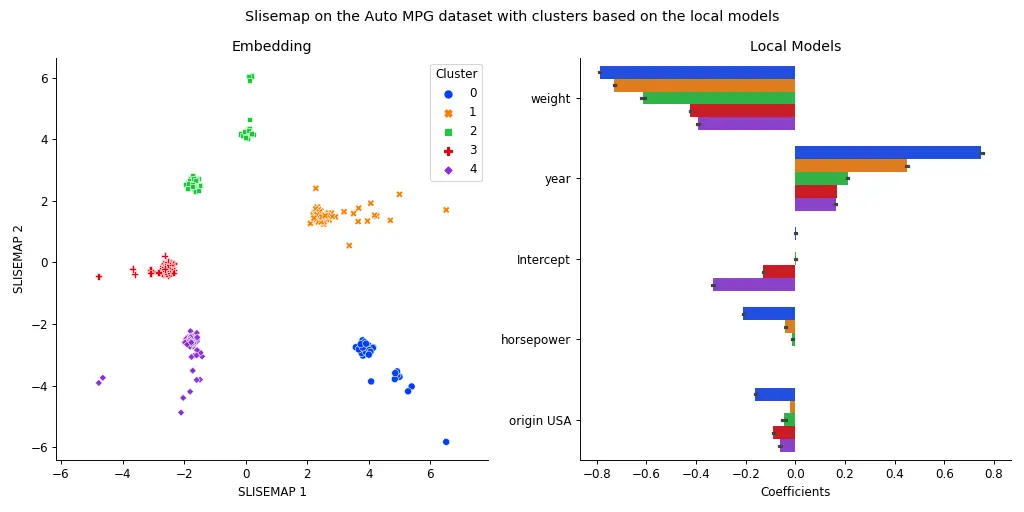SLISEMAP is a supervised dimensionality reduction method, that takes data, in the form of vectors, and predictions from a "black box" regression or classification model as input. SLISEMAP then simultaneously finds local explanations for all data items and builds a (typically) two-dimensional global visualisation of the black box model such that data items with similar local explanations are projected nearby. The explanations consists of interpretable models that locally approximate the "black box" model.
SLISEMAP is implemented in Python using PyTorch for efficient optimisation, and optional GPU-acceleration. For more information see the papers, the examples, or the documentation.
This library also includes the faster SLIPMAP variant, that uses "prototypes" to speed up
the calculations (linear time and memory complexity instead of quadratic).
SLIPMAP is largely compatible with SLISEMAP, just change the class name (Slisemap to Slipmap, see example below).
The new SLIPMAP paper (supplements and slides):
Björklund, A., Seppäläinen, L., & Puolamäki, K. (2024).
SLIPMAP: Fast and Robust Manifold Visualisation for Explainable AI
Advances in Intelligent Data Analysis XXII, IDA 2024, pp. 223-235. Lecture Notes in Computer Science, vol 14642. DOI: 10.1007/978-3-031-58553-1_18 (Best Paper Award)
The full SLISEMAP paper (arXiv, supplements, and slides):
Björklund, A., Mäkelä, J., & Puolamäki, K. (2023).
SLISEMAP: Supervised dimensionality reduction through local explanations.
Machine Learning 112, 1-43. DOI: 10.1007/s10994-022-06261-1
The short demo paper (video and slides):
Björklund, A., Mäkelä, J., & Puolamäki, K. (2023).
SLISEMAP: Combining Supervised Dimensionality Reduction with Local Explanations.
Machine Learning and Knowledge Discovery in Databases, ECML PKDD 2022. Lecture Notes in Computer Science, vol 13718. DOI: 10.1007/978-3-031-26422-1_41.
To install the package just run:
pip install slisemapOr install the latest version directly from GitHub:
pip install git+https://github.com/edahelsinki/slisemapTo use the built-in hyperparameter tuning you also need scikit-optimize, which is automatically installed if you do:
pip install slisemap[tuning]Since SLISEMAP utilises PyTorch for efficient calculations, you might want to install a version that is optimised for your hardware. See https://pytorch.org/get-started/locally for details.
import numpy as np
from slisemap import Slisemap
X = np.array(...)
y = np.array(...)
sm = Slisemap(X, y, radius=3.5, lasso=0.01)
sm.optimise()
sm.plot(clusters=5, bars=5)To use the faster SLIPMAP variant just replace the relevant lines:
from slisemap import Slipmap
sm = Slipmap(X, y, radius=2.0, lasso=0.01)See the examples for more detailed examples, and the documentation for more detailed instructions.




